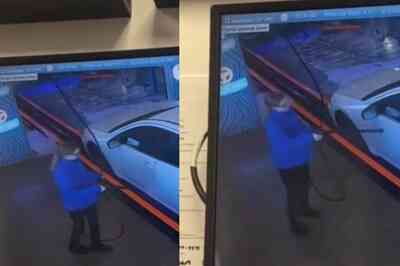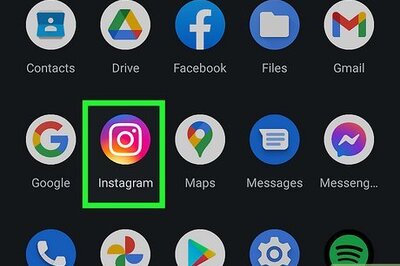
views
Testing Battery Voltage

Unplug your golf cart from the charger and the charger from the wall. Remove the charger plug from the back of the golf cart to disconnect it from the batteries. Unplug the charger from the wall outlet, so it’s not being supplied any power. Always do this before you start troubleshooting golf cart charger problems to prevent accidents.

Test your golf cart batteries to make sure they have at least 25-30 volts. Do this to make sure that the problem is with your charger and not your batteries. Most golf cart chargers only work if the batteries they’re charging have at least 25-30 volts in them. Having batteries that are too dead is one of the most common reasons for a golf cart battery charger not working and can easily cause you to think your charger is at fault, which isn’t true! Your batteries might be too far dead if you leave your golf cart for a long time without turning it on or using it. The juice gradually drains from the batteries and the charger doesn’t work anymore because of that.

Use a voltmeter or a multimeter to check your batteries’ voltage. Turn on the voltmeter or multimeter and set it to the voltage testing mode. Touch the red positive and black negative leads to the positive and negative terminals on each battery. Read the numbers on the voltmeter to see how much charge the batteries have. If you see a reading on the testing meter of at least 25-30 volts, then you probably have a different problem with the charger itself, as you originally suspected.

Charge your cart’s batteries with a car battery charger if they are totally dead. Disconnect all your golf cart’s batteries from one another and remove them from your golf cart. Hook each battery up, one at a time, to a car battery charger and charge each battery for 20-30 minutes to revive them. Any battery with less than 25 volts in it is too dead for a standard golf cart charger to charge it.

Put the batteries back in your golf cart. Hook the batteries back up to each other as they originally were. Plug your golf cart charger into the wall and the back of the golf cart again and see if it works now.
Inspecting and Fixing Connections

Disconnect your golf cart charger. Unplug the charger from the back of the golf cart and remove the charger’s power cord from the wall outlet. Always disconnect the charger before you inspect its connections to be safe. This also allows you to see areas that you can’t examine when the charger is plugged in.

Look inside the charger handle to see if the clips are pushed in. Inspect the two holes in the end of the charger handle closely to find the metal clips inside of them. If the clips are bent in, use a pair of needle-nose pliers to grab them and pull them back out, so they’re touching the post in the handle. The charger handle is the part that you plug into the back of your golf cart to charge it. Try plugging the charger back into the wall and connect the handle to the back of your golf cart after you do this to see if the problem is fixed.

Inspect the charger connections for dirt, debris, wire fraying, and corrosion. Look closely at the connections where the cables attach to the terminals on each battery. Make note of any connections that are dirty, corroded, or have frayed wires. All of the above issues can cause weak connections, which prevent your golf cart charger from working properly. This is another common reason that golf cart battery chargers seem to be broken.

Scrub the battery terminals with a baking soda paste if they’re dirty. Disconnect the batteries from one another inside the golf cart. Mix equal parts water and baking soda and scrub the paste onto dirty and corroded terminals with a stiff-bristled brush. Wipe the terminals dry with a clean, dry cloth after cleaning them. Put on personal protective equipment including gloves and safety glasses before you clean and maintain batteries.

Spray an anti-corrosive spray on the battery terminals. Use any commercial corrosion prevention or anti-rust spray. Hold the canister a few inches away from each terminal and spray enough of the protectant onto it to coat the metal completely. You can find anti-corrosive sprays at automotive supply shops, home improvement centers, and online.

Replace any frayed wires. Loosen the connectors holding the wires in place and remove the wires completely. Put new wires in their place and tighten the connectors to hold them there. Most golf cart battery cables are 6 AWG cables, which is the gauge of the wires. However, you can always take the old cables into an auto supply shop to use as references when purchasing new ones.
Checking and Replacing Fuses and Diodes

Remove the golf cart charger’s cover with a Phillips-head screwdriver. Unplug the charger from the wall and your golf cart. Loosen and remove all the Phillips-head screws that hold the charger’s cover in place, which are usually found near the corners. Lift off the handle and cover. This allows you to access all the internal parts of the charger to start troubleshooting the charger itself. Always make sure you troubleshoot the batteries and the connections and make any necessary fixes before you do this. The problem might not be as big as you think and may be fixable without taking apart the charger!

Remove the transformer wire that connects the two ring-shaped diodes. Locate the diodes on an aluminum plate on one of the charger’s inside walls. Loosen the connectors that hold the U-shaped transformer wire on the diodes and pull it off. Always test the diodes before you check other electrical components. They are more likely to be bad and are easier to fix than other problems.

Check the golf cart charger diodes with a multimeter to make sure they work. Press one of the multimeter’s probes to the part of the diode on the plate and the other probe to the part where the transformer wire was. Write down the readings on the multimeter, switch the probe positions, and record the readings again. Do this for both diodes. Set your multimeter to the diode function or the continuity function to test the diodes. If you get a positive reading in both probe positions or no reading at all in both positions, the diodes are bad. If you get a positive reading in a single probe position, the diodes are good because they are supposed to have one-way continuity.

Replace any bad diodes inside the golf cart charger. Unscrew or pull off the bad diodes from the aluminum plate they attach too. Screw or press a compatible replacement onto the aluminum plate and reconnect the transformer wire. You can buy replacement diodes online or from wherever they sell automotive and golf cart battery supplies. Note that some diodes can be replaced individually and others require you to replace both at once. If you have only one bad diode and your golf cart charger’s diodes can be replaced individually, you only have to replace the bad one.

Test the golf cart charger’s fuse with a multimeter to see if it's bad. Ground the black lead of the multimeter on the screw next to the fuse. Touch the red lead of the multimeter to the other side of the fuse and listen for a beep. If the multimeter doesn’t beep, it means it’s not working. Check the step on replacing a bad fuse in the remedies and repair method below.

Swap out the golf cart charger’s fuse if it is not working. Push or pull the bad fuse out of the slot it snaps into and unscrew the wire connected to the fuse. Press a compatible replacement fuse into the slot, reconnect the wire, and test the fuse with a multimeter to ensure it works. Purchase a replacement fuse with the same amp rating as the old one. The amps are usually written on the fuse itself. You can take the fuse into a shop where they sell replacements to find the right model or look up the part number in the charger manufacturer’s catalog to order a replacement online.
Replacing Circuit Boards

Take the cover off the golf cart charger with a Phillips-head screwdriver. Disconnect the charger from power and your golf cart. Unscrew the Phillips-head screws that keep the charger’s cover on. Pop off the cover and handle to expose the inside of the charger. You don’t need any testing equipment or other tools to inspect your charger’s circuit boards.

Examine the charger’s circuit boards for visible damage. Look around inside the charger to find the circuit boards, which look like white or green panels with a bunch of little electronics embedded in them. Inspect all the circuit boards you see for signs of water damage, corrosion, melting, and other obvious signs that they’re bad. Some models of battery chargers have multiple circuit boards, while others just have one. There isn’t really any good way to test circuit boards for problems other than by doing a visual inspection. Bad circuit boards should be pretty obvious. Internal circuit boards can get ruined by weather-exposure if you leave your charger outside for long periods of time or if the charger has been exposed to extreme temperatures.

Put new circuit boards in your golf cart charger if any boards are damaged. Remove the wires connected to the circuit board you want to replace and pull out the board. Press a new compatible replacement board into place, exactly where the old one was, and reconnect all the wires. If you aren’t sure what replacement boards to buy, remove the bad boards first and take them to a store where they sell golf cart charger parts and ask an employee to help you find the right replacement. Refer to the instructions in the replacement board’s box if you have any doubts about how to connect it. If your charger has multiple bad circuit boards, follow the same procedure to replace each one.




















Comments
0 comment